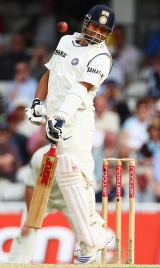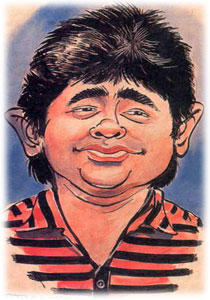An exceptional performer can recalculate his skills and alter himself, says
There is no weaseling out of this: I was wrong about Sachin Tendulkar. Earlier this year, his struggle painful to watch, I wondered: if he couldn’t mirror the exalted standard of his past, then why play? It was a miscalculation of the rage that courses through the uncommon athlete’s veins.
Even now, across continents, you can hear the hum of Tendulkar’s desire. For just playing. For runs. For winning. He knows that the great athlete has to prove himself, constantly, that we’re not interested in his yesterdays but only his todays.
I first met Tendulkar 20 years ago when he was 14 and have admired him since. Not because he scored runs with a ferocious beauty but because he possessed a powerful sense of duty and met acclaim with serenity. No sportsperson in 20 years has moved me like him except the elastic Michael Jordan, who was like a Michelangelo statue come to athletic life. But the batsman was ours, he was hope tugging at his box and our hearts. Jordan taught us that human flight was possible. Tendulkar is still teaching us.
Like some bonzai schoolmaster holding class, he taught us that don’t judge a kid by his voice. He taught us to sit down and back in our drawing rooms because he was going to hang around the crease for a while. He taught us that champions find the necessary calm amidst the delirium. He taught us that playing for India was fun but also a responsibility. And he taught us he could make grown men cry, sometimes watches, sometimes bowlers.
He taught us that only the exceptional performer can recalculate his skills and alter himself. Haile Gebreselassie, unable to maintain the speed of the 10,000 metres, has morphed into a marathon champion. Tendulkar rearranged his repertoire, and while he was not the greatest anymore, he taught us he could still find a way to be good.
One last lessonBut this year, I began to believe he was declining, and quickly, because he was unconvincing for long periods, wearing an unsurety that looked so foreign on him. The vincible hero. At 34, how do you stop time, and deterioration? But 20 years after first learning from Tendulkar, there was one last lesson he had to teach. About concentration.
If first his getting beaten made me flinch, what made me keep watching was his refusal to flinch. The ball went by and he started again, like a student trying again to solve a problem. Every ball was a new ball to Tendulkar, a new life, a new start, it was like he had cleansed his memory of the previous delivery that hissed past his bat. It was like Jimmy Connors swearing the last point was unimportant, only the next one mattered.
What control of mind does it take to erase the immediate past, to not let doubt fester, to stay alert even as the bowler is exposing your hesitancy? The easy option would be to react, to swish harder. The hard choice was to just stay, to start afresh every ball with hope, to view temptation with priestly detachment. Tendulkar chose well. He taught us in this time that the first rule of sport is not to look good, it is to survive.
Tendulkar’s body may have healed and allowed him a fuller expression of strokes, but it is his confidence in himself, confidence that was shaken and rattled surely but never extinguished, that carried him on. He still gets beaten some days, but he is also more fluent, too, astonishing no less in his ability to rack up scores of 99, 93, 8, 17, 99, 8, 55, 71, 94, 30, 0, 16, 43, 79, 47, 72, 21, 4, 99, 29, 97 in his last 21 one-day innings.
What does Tendulkar play for? Team, himself, pride, records? Maybe he plays because part of him is just a boy who finds himself when bat meets ball. Maybe he plays because of a boy agog in the stands. Maybe he has summoned this last reservoir of energy to show a kid, now old enough to understand, why, for 18 years, the world has made such a fuss about his father.



